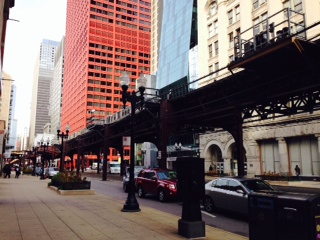The Chicago Loop Alliance wants to improve Wabash Avenue by creating a stronger business district, making it family friendly and adding more modern architecture.

Photo by: Katherine Davis
Loop residents have complained about increased homelessness and a lack of upscale businesses on Wabash Avenue.
Laura Jones, associate director of the Chicago Loop Alliance, said residents have also complained about noise from Wabash.
“The question isn’t necessarily what needs to be improved,” Jones said. “It’s how do we keep our iconic downtown exciting and different to keep people coming back to see what’s new.”
The alliance announced its first strategic action plan, which is a five-year blueprint for attracting more people and investment to the area.
The Chicago Loop Alliance is an organization dedicated to creating, managing and promoting high-performing urban experiences in an effort to attract people to the Loop, according to the organization’s website.
Jones said the plan consists of four “catalytic initiatives” that involve transforming Wabash Avenue by focusing on upgrading retail. The goal is to create a “sensory experience” on Wabash that will invite people to come back, Jones said.
The group will focus on lighting, cleanliness, hospitality, streetscape and landscaping, she said.
Devices to decrease noise from the L trains that run over Wabash have also been discussed.
Homelessness has been an ongoing issue on Wabash Avenue, which Jones said is caused by unemployment, mental illness and addictions.
The group wants to assist visitors by providing information and answering questions, and it also wants to offer outreach services for homeless people, she said.
Stephen Wilkes, who has been living on State Street for two years and is frequently on Wabash Avenue, said he supports upgrading Wabash Avenue if it would bring more revenue to the area and cut down on homelessness.
“I think it would be nice to have a few more businesses on Wabash,” Wilkes said. “And homelessness, I think that’s an issue that needs to be resolved.”
Wilkes said devices to muffle passing L trains could be beneficial, but they aren’t necessary and taxpayer money could be used elsewhere. He said all the planned upgrades to Wabash sound like a good idea, but said he isn’t sure if it’s financially realistic.
“If it’s going to bring more revenue to Chicago and benefit the city, then go ahead and do it,” Wilkes said. “But I think it’s just a waste of taxpayer’s money, because I don’t really think it’s going to benefit anything.”
Anthony Soave, a Columbia College Chicago student who walks along Wabash Avenue frequently when going to class, said he hates the noise from the L trains and supports the idea of noise muffling devices.
“When I’m walking on Wabash Avenue and talking with friends and the train goes by, it’s so loud and it really disrupts conversation,” Soave said.
He said there aren’t any restaurants or stores he frequents on Wabash, and he supports the idea of upgrading the street.
“Wabash could be better in many ways,” Soave said. “It could be more like Michigan Avenue or State Street.”
Jones said she wants visitors, Loop residents and Chicagoans to enjoy Wabash Avenue and said she is hopeful that the planned improvements will have an influential impact on that.
“Our vision is to create, maintain and promote the Chicago Loop as a vibrant global business center and a recognized world class destination that attracts people and investment,” Jones said.








Be First to Comment